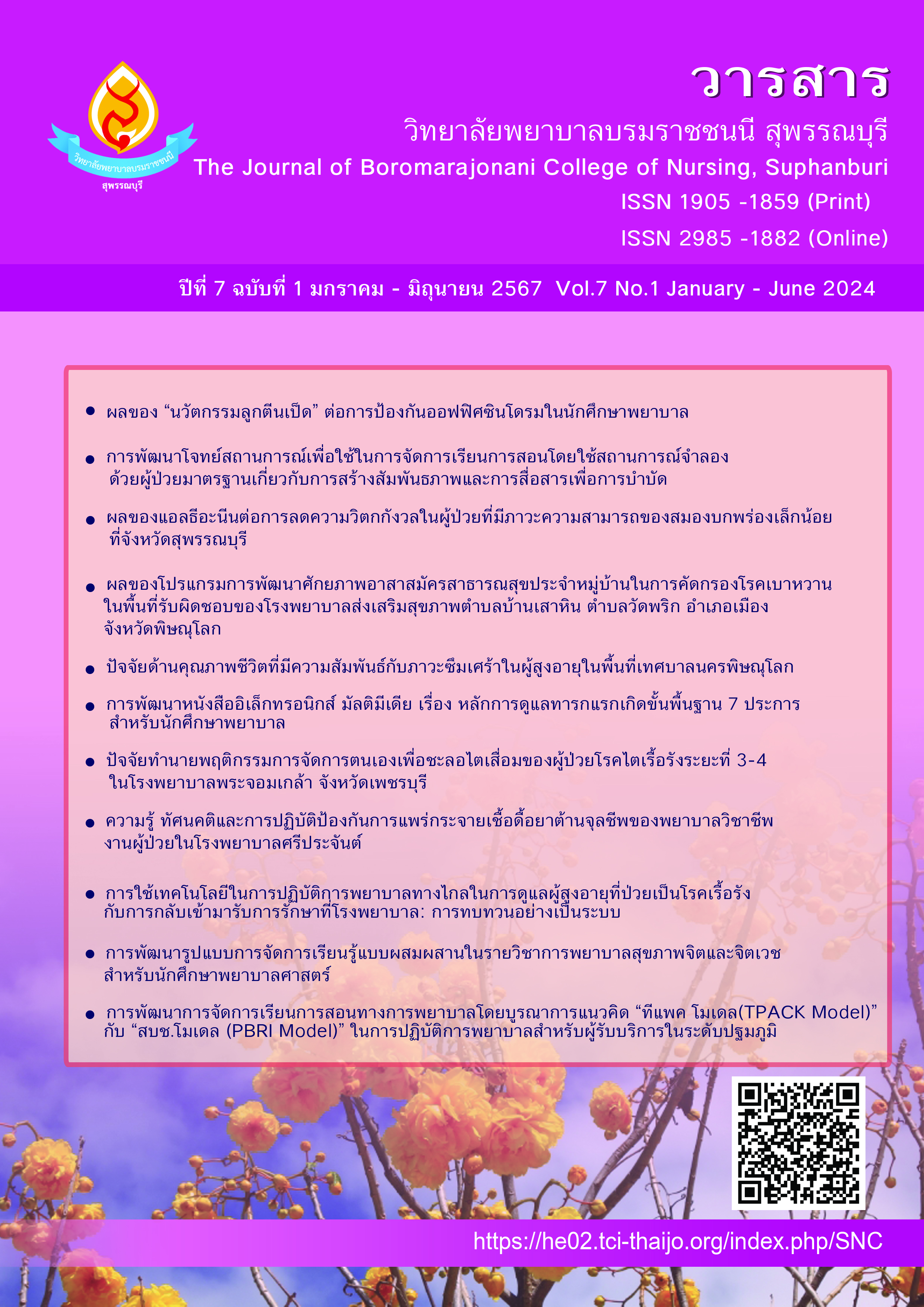Effects of Capacity Building program for Village Health Volunteers for Diabetes screening skills in Ban Sao Hin Health Promoting Hospital's Area Wat Prik Subdistrict, Mueang District, Phitsanulok Province
Keywords:
Diabetes, Capacity Building Diabetes screening, Village Health Volunteers, Capacity Building programAbstract
This quasi-experimental research aims to compare the differences in knowledge scores and screening practices for diabetes among village health volunteers before and after participating in a capacity building program. The sample group consisted of 50 individuals selected through a specific purposive sampling method within the group that had not undergone training and had less than 5 years of work experience. The experimental tool utilized was a capacity development program for village health volunteers in screening for diabetes, along with data collection tools in the form of a questionnaire assessing knowledge and practices in diabetes screening. Data analysis encompassed frequency distribution, percentage, mean, standard deviation, and a paired t-test for comparing means within the experimental group before and after program implementation.
The research findings indicated that, following their participation in the capacity development program, village health volunteers exhibited significantly improved scores in both knowledge and practical skills related to diabetes screening compared to their pre-program scores p<.001 Consequently, the utilization of the capacity development program for village health volunteers in diabetes screening can elevate their knowledge, preparedness, and screening competencies, allowing them to offer accurate guidance to the public. This approach fosters community engagement and empowers communities to adopt self-care practices for preventing chronic non-communicable diseases.
References
กระทรวงสาธารณสุข. (2565). ระบบข้อมูลสุขภาพ. https://hdcservice.moph.go.th/hdc/ main/index.php
กรมควบคุมโรค กระทรวงสาธารณสุข. (2565). สถานการณ์โรคเบาหวาน. https://pr.moph.go.th/?url=pr/detail/2/02/181256
กรมสนับสนุนบริการสุขภาพ กระทรวงสาธารณสุข. (2565). คู่มือสำหรับเจ้าหน้าที่หลักสูตรฝึกอบรมสมาร์ท อสม.และ อสม. หมอประจำบ้าน ปีงบประมาณ 2565. https://hss.moph.go.th/HssDepartment/file_reference/202204252089496483.pdf
กรมสนับสนุนบริการสุขภาพ. (2556). แนวทางการดำเนินงาน มาตรฐานอาสาสมัครสาธารณสุขประจำหมู่บ้าน เรื่อง การเจาะเลือดฝอยจากปลายน้ิวเพื่อคัดกรองโรคเบาหวาน โดยใช้เครื่องตรวจน้ำตาลในเลือดชนิดพกพา. กรุงเทพฯ: องค์การสงเคราะห์ทหารผ่านศึก.
สมาคมโรคเบาหวานแห่งประเทศไทยในพระราชูปถัมภ์สมเด็จพระเทพรัตนราชสุดาฯ สยามบรมราชกุมาร. (2560). แนวทางเวชปฏิบัติสำหรับโรคเบาหวาน 2560. ปทุมธานี: ร่มเย็น มีเดีย.
ขวัญตา เพชรมณีโชติ, ลักษณา พงษ์ภุมมา, อนิสา อรัญคีรี และพัชรี เตาวลานนท์. (2564). ผลของโปรแกรมการเรียนรู้แบบมีส่วนร่วมต่อความรู้และการปฏิบัติในการดูแลผู้ป่วยโรคความดันโลหิตสูงของอาสาสมัครสาธารณสุขประจำหมู่บ้าน. วารสารพยาบาลกระทรวงสาธารณสุข, 31(3), 28-41.
จริยาพร ศรีจอมพล และเบญจา มุกตพันธุ์. (2561). ผลของโปรแกรมการเรียนรู้เชิงประสบการณ์ต่อความรู้และการปฏิบัติการตรวจน้ำตาลในเลือดด้วยวิธีเจาะจากปลายนิ้วในอาสาสมัครสาธารณสุขประจำหมู่บ้าน. วารสารสาธารณสุขล้านนา, 18(2), 102-115.
จันทร์จิรา อินจีน,วิภาพร สิทธิสาตร์,จันทิมา นวะมะวัฒน์ และปริญดา ศรีธราพิพัฒน์. (2562). การพัฒนาสมรรถนะการคัดกรองโรคไม่ติดต่อเรื้อรังของอาสาสมัครสาธารณสุข ประจำหมู่บ้าน: การสังเคราะห์งานวิจัยอย่างเป็นระบบ.Humanities, Social Sciences and arts, 12(6), 1175-1191.
นิดา มีทิพย์ เดชา ทำดี และประพิมพ์ พุทธิรักษ์กุล. (2559). ผลของการเรียนรู้เชิงประสบการณ์ต่อความรู้และการปฏิบัติการคัดกรอง และการให้คำแนะนำโรคความดันโลหิตสูงของอาสาสมัครสาธารณสุขประจำหมู่บ้าน. พยาบาลสาร มหาวิทยาลัยเชียงใหม่, 43(5), 104-115.
ปภากร เผ่าเวียงคำและศรีสุรางค์ เคหะนาค. (2564). ปัจจัยที่ส่งผลต่อการปฏิบัติงานเกี่ยวกับโรคเบาหวานตามบทบาทของอาสาสมัครสาธารณสุขประจำหมู่บ้านในอำเภอสามชุก จังหวัดสุพรรณบุรี.วารสารสาธารณสุขล้านนา, 18(2), 116-128.
ภคภณ แสนเตชะ และประจวบ แหลมหลัก. (2563). ผลของโปรแกรมพัฒนาความรอบรู้ด้านสุขภาพในผู้ป่วยโรคเบาหวานชนิดที่ 2 ตําบลแม่ปม อําเภอเมือง จังหวัดพะเยา. วารสารสุขศึกษา,43(2), 150-164.
สุวภัทร นักรู้กำพลพัฒน์,นิชนันท์ สุวรรณกูฏ และอมรรัตน์ นธะสนธิ์. (2562). ประสบการณ์อาสาสมัครสาธารณสุขประจำหมู่บ้าน ในการดูแลผู้ป่วยเบาหวานในชุมชน.วารสารวิทยาศาสตร์และเทคโนโลยี มหาวิทยาลัยอุบลราชธานี, 21(1), 109-116.
อัจฉริยา เชื้อเย็น,ศิวพร อึ้งวัฒนา และวิลาวัณย์ เตือนราษฎร์. (2565). ผลของโปรแกรมการเรียนรู้เชิงประสบการณ์ต่อความรู้และการปฏิบัติตัวในการตรวจน้ำตาลในเลือดด้วยวิธีเจาะปลายนิ้วในอาสาสมัครสาธารณสุขประจำหมู่บ้าน. วารสารสาธารณสุขล้านนา, 18(2), 102-115.
Kolb, D. A. (1984). Experiential learning: Experience as the source of learning and development. New Jersey: Prentice-Hall.
World Health Organization. (2023). Diabetes. https://www.who.int/news-room/fact- sheets/detail/diabetes
Downloads
Published
Issue
Section
License
Copyright (c) 2024 Boromarajonani College of Nursing, Suphanburi

This work is licensed under a Creative Commons Attribution-NonCommercial-NoDerivatives 4.0 International License.
บทความที่ได้รับการตีพิมพ์เป็นลิขสิทธิ์ของวารสารวิทยาลัยพยาบาลบรมราชชนนี สุพรรณบุรี
ข้อความที่ปรากฏในบทความแต่ละเรื่องในวารสารวิชาการเล่มนี้เป็นความคิดเห็นส่วนตัวของผู้เขียนแต่ละท่านไม่เกี่ยวข้องกับวิทยาลัยพยาบาลบรมราชชนนี สุพรรณบุรี และคณาจารย์ท่านอื่นๆในวิทยาลัยฯ แต่อย่างใด ความรับผิดชอบองค์ประกอบทั้งหมดของบทความแต่ละเรื่องเป็นของผู้เขียนแต่ละท่าน หากมีความผิดพลาดใดๆ ผู้เขียนแต่ละท่านจะรับผิดชอบบทความของตนเองแต่ผู้เดียว



